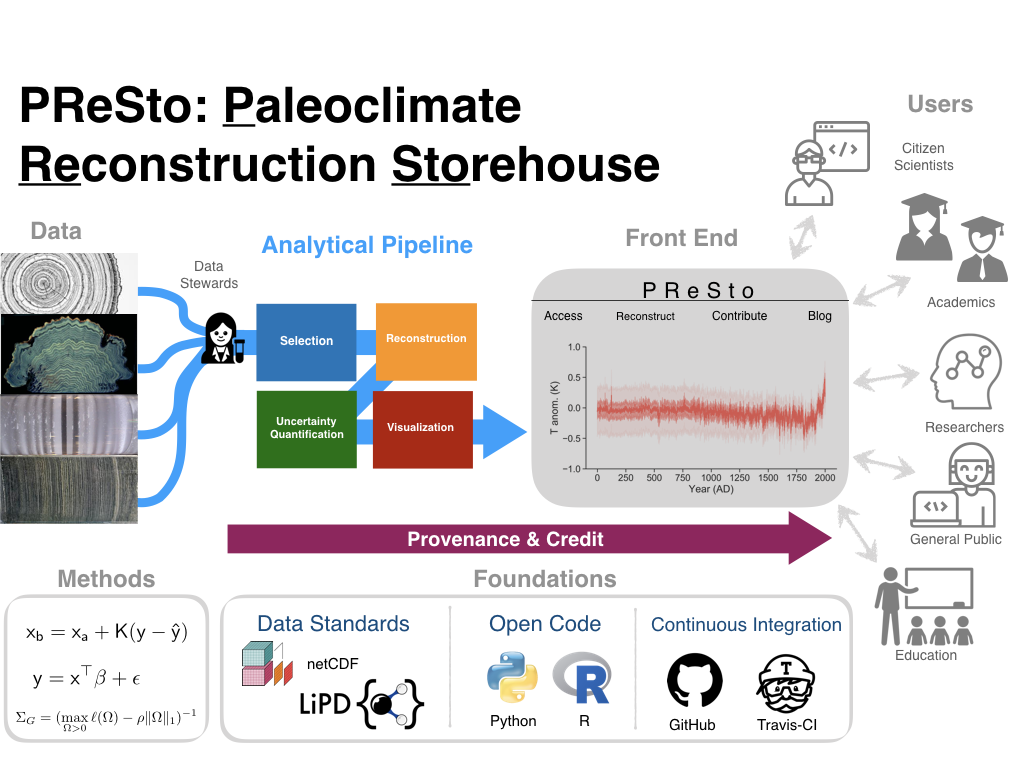About us
About PReSto
Paleoclimate Reconstruction Storehouse
Paleoclimate reconstructions are among the most widely used scientific products from the paleoclimate community. They constitute statistical inference based on thousands of field and laboratory measurements: a single chart like the "Hockey Stick" temperature reconstruction of the past 1,000 years synthesizes what is known about past climate variations in a form that is easily digestible within and beyond the geosciences: in climate science of course, but also the paleogeosciences at large, and even in the social and life sciences. However, such reconstructions are infrequently updated and commonly lag many years behind the latest data and methods. Until recently, the lack of a central clearinghouse also made them difficult to find. Finally, paleoclimate reconstructions involve potentially many subjective choices that have not been exhaustively explored, and are opaque to most users. Enter the Paleoclimate Reconstruction "Storehouse" (PReSto), an NSF-funded project. This website is part of that project, focusing on:
- Providing broad access to paleoclimate reconstructions via a responsive web front end.
- Allow users to easily visualize, download and compare published reconstructions.
- Generally lower friction to develop or use paleoclimate reconstructions.
Note: This website is in development. Visualizations are preliminary and should not be used in any publications.

Key Components
Data
We have developed lipdverse.org as a simple source of version controlled paleoclimate datasets that will supply data to PReSto reconstruction algorithms. Please explore lipdverse.org for a user-friendly portal to find, visualize, and download proxy data sets. lipdverse is open access and broadly useful beyond the PReSto project, contributing to data and methodological transparency and open science.
Recommender system
We developed a recommender system to help standardize paleoclimate datasets. This system is now implemented on the LiPD playground, where it helps standardize the paleoData part of a LiPD file. A similar system for the ChronData part is under development. To learn more about the recommender system, please see Manety et al., 2022: "PaleoRec: A sequential recommender system for the annotation of paleoclimate datasets".
Analytical pipelines
We are building analytical pipelines that automatically update reconstructions for a handful of test cases. Starting with:
- Data assimilation for the Common Era
- Reconstructions of Holocene Temperature variability
Details, codebases and results for these pipelines will be updated as they come online.
We have also developed a number of python and R packages to assist with data processing and analysis:
Front End
This website is a front end that provides ready access to reconstructions and data visualization.
Education and outreach
Later in the project, workshops will train data stewards to properly digitize and describe paleoclimate datasets for applications such as PReSto and trainings for early-career researchers to use this cyberinfrastructure to further their scientific objectives. Furthermore, we're working to develop resources for K-12 and tribal college teachers in Northern Arizona, and design and offer one-day educational workshops for teachers throughout the region. The workshop will be centered around familiarizing teachers with PReSto, including how to use the platform to explore case-studies that place key historical junctures in the context of environmental change.
More about this site
This site is being developed to share paleoclimate reconstructions. Code to process data and generate figures can be found at our Github Repository.
Our Charter
Development of the PReSto project is overseen by the Executive Committee according to our charter, found here.
Contact
If you have feedback about this site, please contact Michael Erb at michael.erb@nau.edu.
Funding
This material is based upon work supported by the National Science Foundation under Grant No. EAR-1948746. Any opinions, findings, and conclusions or recommendations expressed in this material are those of the authors and do not necessarily reflect the views of the National Science Foundation.
This project also expands upon the foundations built by earlier NSF grants: Grant No. EAR-1347221 and Grant No. ICER-1541029


